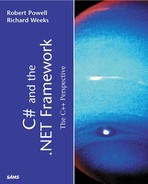Chapter 4.4. WebServices
IN THIS CHAPTER
Accessing data with distributed applications has produced various technologies over the years. From general Remote Procedure Calls (RPC) mechanisms, such as XML-RPC, to full-blown distributed objects, such as CORBA and DCOM. The WebServices paradigm is based on the simple premise of extending the basic XML-RPC mechanism to allow for procedure calls over the Internet using open transport protocols such as HTTP over TCP/IP connections.
.NET supports WebServices invocations through HTTP POST, HTTP GET, and Simple Object Access Protocol (SOAP). Before the introduction of WebServices support in .NET, developing a WebService host, proxy, and client was a non-trivial task. Microsoft even released a SOAP Toolkit for Visual Studio 6 that allowed a developer to expose a COM object over the Internet. This Toolkit falls short of the support offered by .NET and C#. Developing a WebService requires little more than defining a public set of methods to expose to clients, along with the proper return types and applying simple WebMethodAttributes to those methods.
In the course of this chapter, a small EchoService will serve as the starting point to familiarize you with the concept of WebServices and eventually a WebService interface will be added to the EmployeeBrowser ASP WebApplication.
